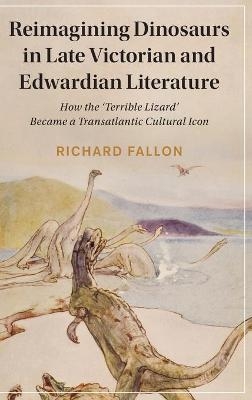
Reimagining Dinosaurs in Late Victorian and Edwardian Literature
How the ‘Terrible Lizard' Became a Transatlantic Cultural Icon
Seiten
2021
Cambridge University Press (Verlag)
978-1-108-83400-1 (ISBN)
Cambridge University Press (Verlag)
978-1-108-83400-1 (ISBN)
Reimagining Dinosaurs is aimed at literary scholars, historians of science, and curious general readers. Unlike previous works, which suggest that American museums made dinosaurs famous, this book argues that British and American popular literature was critical for transforming the dinosaur into a transatlantic cultural icon between 1880 and 1920.
When the term 'dinosaur' was coined in 1842, it referred to fragmentary British fossils. In subsequent decades, American discoveries—including Brontosaurus and Triceratops—proved that these so-called 'terrible lizards' were in fact hardly lizards at all. By the 1910s 'dinosaur' was a household word. Reimagining Dinosaurs in Late Victorian and Edwardian Literature approaches the hitherto unexplored fiction and popular journalism that made this scientific term a meaningful one to huge transatlantic readerships. Unlike previous scholars, who have focused on displays in American museums, Richard Fallon argues that literature was critical in turning these extinct creatures into cultural icons. Popular authors skilfully related dinosaurs to wider concerns about empire, progress, and faith; some of the most prominent, like Arthur Conan Doyle and Henry Neville Hutchinson, also disparaged elite scientists, undermining distinctions between scientific and imaginative writing. The rise of the dinosaurs thus accompanied fascinating transatlantic controversies about scientific authority.
When the term 'dinosaur' was coined in 1842, it referred to fragmentary British fossils. In subsequent decades, American discoveries—including Brontosaurus and Triceratops—proved that these so-called 'terrible lizards' were in fact hardly lizards at all. By the 1910s 'dinosaur' was a household word. Reimagining Dinosaurs in Late Victorian and Edwardian Literature approaches the hitherto unexplored fiction and popular journalism that made this scientific term a meaningful one to huge transatlantic readerships. Unlike previous scholars, who have focused on displays in American museums, Richard Fallon argues that literature was critical in turning these extinct creatures into cultural icons. Popular authors skilfully related dinosaurs to wider concerns about empire, progress, and faith; some of the most prominent, like Arthur Conan Doyle and Henry Neville Hutchinson, also disparaged elite scientists, undermining distinctions between scientific and imaginative writing. The rise of the dinosaurs thus accompanied fascinating transatlantic controversies about scientific authority.
RICHARD FALLON is a Leverhulme Trust Early Career Fellow at the University of Birmingham.
1. Reclaiming Authority: Henry Neville Hutchinson, Popular Science, and the Construction of the Dinosaur; 2. Reinventing Wonderland: Jabberwocks, Grotesque Monsters, and Dinosaurian Maladaptation; 3. Rearticulating the Nation: Transatlantic Fiction and the Dinosaurs of Empire; 4.Rediscovering Lost Worlds: Arthur Conan Doyle and the Modern Romance of Palaeontology
| Erscheinungsdatum | 25.10.2021 |
|---|---|
| Reihe/Serie | Cambridge Studies in Nineteenth-Century Literature and Culture |
| Zusatzinfo | Worked examples or Exercises |
| Verlagsort | Cambridge |
| Sprache | englisch |
| Maße | 158 x 235 mm |
| Gewicht | 590 g |
| Themenwelt | Geisteswissenschaften ► Sprach- / Literaturwissenschaft ► Anglistik / Amerikanistik |
| Geisteswissenschaften ► Sprach- / Literaturwissenschaft ► Literaturgeschichte | |
| Geisteswissenschaften ► Sprach- / Literaturwissenschaft ► Literaturwissenschaft | |
| ISBN-10 | 1-108-83400-0 / 1108834000 |
| ISBN-13 | 978-1-108-83400-1 / 9781108834001 |
| Zustand | Neuware |
| Haben Sie eine Frage zum Produkt? |
Mehr entdecken
aus dem Bereich
aus dem Bereich
Poetik eines sozialen Urteils
Buch | Hardcover (2023)
De Gruyter (Verlag)
CHF 83,90
Buch | Softcover (2024)
belleville (Verlag)
CHF 27,95


